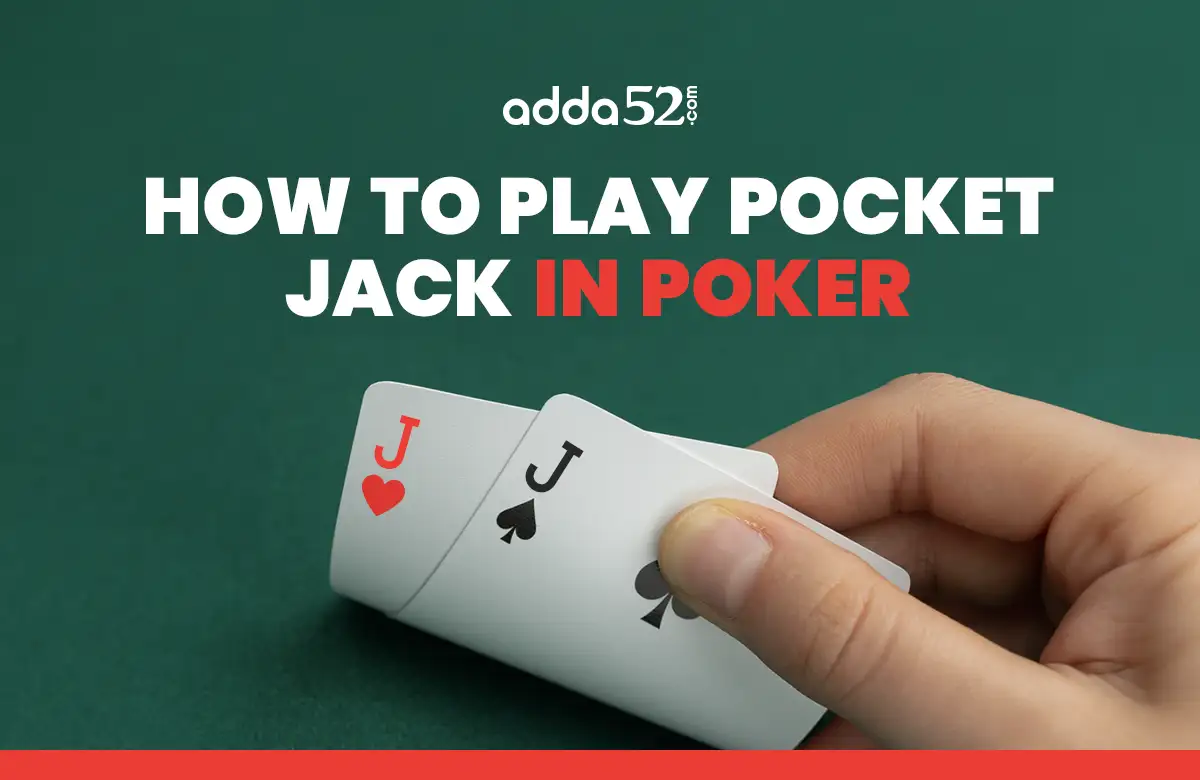
Introduction
The article gives insights on skillfully and mindfully navigating playing Pocket Jacks, a strong yet challenging starting hand. It emphasises the challenges caused by overcards and aggressive play, which can make Pocket Jacks tricky to manage as the game progresses. It also explains the crucial pre-flop and post-flop strategies to consider while playing Pocket Jacks.
What is Pocket Jacks?
Pocket Jacks refers to being dealt two Jack cards as your initial poker hand. It is the fourth-best starting hand, but it can be tricky to play this hand as the game progresses.
Players should remember the famous saying about Pocket Jacks, “ There are three ways to play Pocket Jacks, and they’re all wrong.”
Preflop Strategies for JJ
If you hold Pocket Jacks, it is crucial to know that only in 12% of the cases will someone on the table be dealt starting hands bigger than yours.
Let’s look at Pocket Jacks’ equity based on the number of players playing at the table. Below are the statistics on how often you will win with Pocket Jacks:
10 Players - 19%
9 Players - 22%
8 Players - 25%
7 Players - 29%
6 Players - 34%
5 Players - 40%
4 Players - 49%
3 Players - 61%
2 Players - 78%
Below are some of the major scenarios to keep in mind while playing with Pocket Jacks:
-
Unopened Pots:
Adopting an aggressive betting strategy is recommended when Pocket Jacks (JJ) are dealt in unopened pots that no player has yet entered with a raise. So, instead of just calling (flat-calling) when it is your turn to act, you must make a raise. It allows you to gauge the strength of your opponent's hands, seize control of the pot size, and potentially narrow down the number of players continuing in the hand. However, it is critical to consider factors like your position, the tendencies of your opponents, and the game dynamics at that moment.
-
3-bet with JJ:
3-bet with Pocket Jacks is a good strategy, but given Pocket Jack’s tricky nature, it is advised that players should play this hand very carefully. Given that someone has already raised, this means that there is already some interest involved in the pot. However, being among the top 2-3% of the starting hands of the game, it is also not advisable to take this hand lightly. Hence, before 3-betting with Pocket Jacks, it is essential to consider other factors, such as your position while betting and how your opponents are playing.
-
4-Bet too with JJ:
Ideally, it is never recommended to fold hands as strong as Pocket Jacks during 4-bet. But if you sense that you are playing with players who only 4-bet on starting hands like Pocket Aces, Pocket Kings, Pocket Queens and Ace-King, in this situation, you must fold and save your bankroll.
If you are up against more balanced players, then with Pocket Jacks, players in later positions should 4-bet and push their opponents to make mistakes, while in early positions like Small Blind or Big Blind, you should go forward and do a 5-bet shove.
Postflop Strategies for JJ
While playing Pocket Jacks in poker, the post-flop phase demands aggression, caution, and keen observation. The post-flop stage can dramatically change the game's dynamics, and your approach toward playing Pocket Jacks requires an adaptable strategy. Here are some essential pointers to guide your play during post-flop:
-
Adjust Bet Size Based on Flop Texture:
Adequate bet sizing with Pocket Jacks post-flop is essential for pot management and influencing opponent decisions. In dry or low-value flops, you should always bet higher with Pocket Jacks as there is a high possibility that Pocket Jacks are overcards in the game. On the other hand, if the flop contains overcards in any format, you need to be more cautious and save the pot from getting unreasonably bloated.
Example:
If the flop contains 2♣ 5♦ 8♥ flop, you can play aggressively with Pocket Jacks. On the other hand, if the flop looks somewhat like K♦ A♥ 8♣, there is a possibility that the other player who raised might have Pocket Aces or Kings.
-
How to play on an Ace, King or Queen Flop:
While playing with Pocket Jacks, the chances of being dealt an overcard on the flop are as high as 57%. Hence, you should check at least one of the turn or river phases. The desired actions can be shown in the table.
|
Round |
Flop |
River |
Turn |
|---|---|---|---|
|
Option 1 |
Bet |
Check |
Bet |
|
Option 2 |
Check |
Bet |
Bet |
In short, you need to exercise control over the pot size during these two rounds. If you are raised during these rounds, you should fold this hand without getting attached.
-
Play carefully in 3 or 4 Bet Pots:
Avoid folding JJ in a 3-bet or 4-bet situation, as Pocket Jacks is the fourth-best starting hand. Players can choose to fold based on their opponent’s hand strength; otherwise, JJ is a strong hand that should be played mindfully and confidently. If you understand the playing behaviour of your opponent, then it is advisable to adjust your gameplay accordingly.
Challenges in Pocket Jacks
-
Overcard Threat:
As an overpair, Pocket Jacks has comparatively more value than the community cards. JJ faces trouble when betting when an overpair like AA, KK, or QQ appears at the flop table. Players with JJ have to confront this challenge around 57% of the time.
-
Vulnerability as an Overpair:
Playing Pocket Jacks is difficult when they come across players playing aggressively post-flop. And there is a probability that overcards might hit the table during the turn and river rounds.
-
Postflop complexity
Bet sizing and Bluff-catching are must-have skills while playing with Pocket Jacks when overpairs are on the table. Primarily, new players are not adept at these skills and, hence, find it challenging to navigate, making their win rate worse by making big losses.
Frequently Asked Questions
What is Pocket Jacks?
Pocket Jacks (JJ) is the fourth-best starting hand in Poker, where you are dealt two Jacks as hole cards.
How frequently does JJ win?
Depending on the number of payers, Pocket Jacks' chances of winning range from 19% to 78%. Pocket Jacks are 78% the favourite to win when dealt while playing heads up, while only 19% times are favourites when playing with 6 players.
What are Jacks known as in Poker?
Jacks are also known as Hooks due to the resemblance of ‘J’ to a fish hook. Like a hook, many players get hooked to it and sometimes lose against overcards.
Conclusion
Mastering Pocket Jacks in poker requires a balance of aggression, caution, and a strategic bend of mind. While it ranks as the fourth-best starting hand, its vulnerability to overcards and the intricacies of post-flop play make it challenging to navigate. By adopting a flexible strategy, players can effectively manage Pocket Jacks. This article provides detailed insights into leveraging Pocket Jacks, emphasizing the importance of understanding table dynamics and reading opponents.
